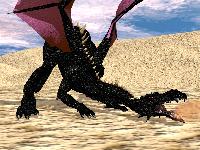
Maelwyth originally lived in the jungles of Basoto, he was worshipped as a god by the lizardmen who lived there. Unlike the other dragons, he tried to civilize the lizardmen under his control and expand their influence. Unfortunately, the lizardmen could not survive in the dry savannah and deserts to the east.
Maelwyth fought with Galarebryn but failed to kill him so he turned his interest to the Thessan Desert to the east. The elder dragon Shennodan ruled over the desert with an iron claw. Shennodan kept his people, the Thessali tribesmen, in check by destroying many of the natural oases that occurred in the scrublands and the desert. Maelwyth secretly recreated the oases and informed the Thessali of the new oases.
When Shennodan discovered Maelwyth’s treachery he flew into a rage and went to attack Maelwyth. Maelwyth, who had correctly deduced that Shennodan’s weakness was water, lured him to the eastern ocean where they fought. Feigning injury, Maelwyth flew closer to the sea. Shennodan, seeing victory dived to attack Maelwyth. At the last minute, Maelwyth dived aside, causing Shennodan to crash into the sea. Maelwyth dived upon Shennodan, forcing him further beneath the sea. Maelwyth carried Shennodan’s body back to the desert where it is said to still lie.
Maelwyth’s demise is shrouded in mystery. After the death of Shennodan he expanded his rulership to the north into Kaylonna. After the deaths of Naymakh and Aracla he began to expand his territory eastwards across the continent. It is thought he may have tangled with Rothgar coming south from the Northlands. Scholars believe he was the twelfth dragon to be killed.
A few important people in the upper echelons of the churches of Phaedra and Orloth know the truth about Maelwyth. He did not die, but was imprisoned by a group of mages near the end of the Second Age. He was finally killed in the year 998TA using an axe made from the bones of Kaelvaz, as foretold in the Lathwyn Oracles.
